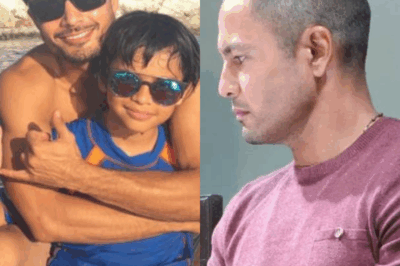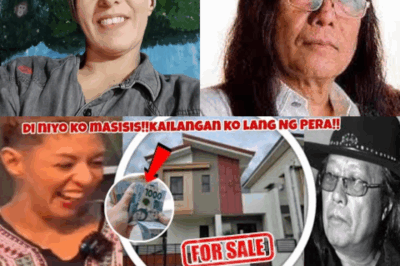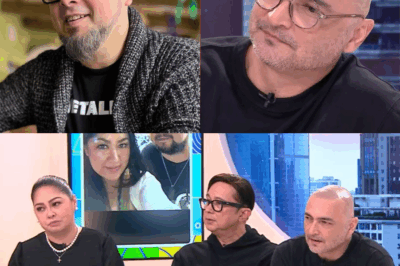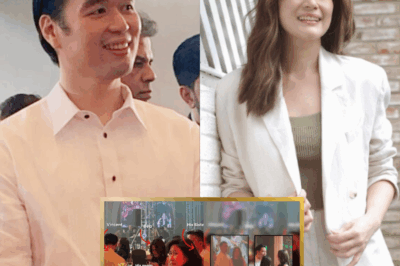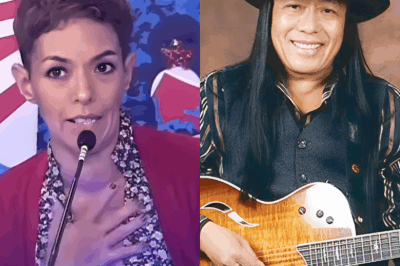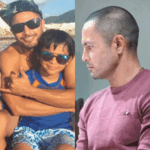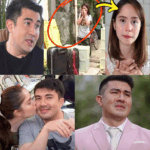They Weren’t Just Fans — They Came With Quiet Hearts to Thank the Man Who Pulled Them From the Shadows

Quezon City, Philippines — As workers carefully arranged flowers and candles at Freddie Aguilar’s star on the Eastwood City Walk of Fame last Wednesday, passersby paused to pay their respects. Some took photos. Others stood silently, head bowed. But among the mourners was a smaller, quieter group—unnoticed by many, yet deeply significant.
They did not bring signs. They wore no fan merchandise. Most didn’t sing or hum Aguilar’s iconic ballads. These weren’t superfans looking for the perfect photo or a news headline. These were the people Freddie Aguilar once helped—quietly, humbly, and without asking for anything in return.
They came not with admiration alone, but with gratitude. Not for a song, but for a life changed.
The Musician with a Mission
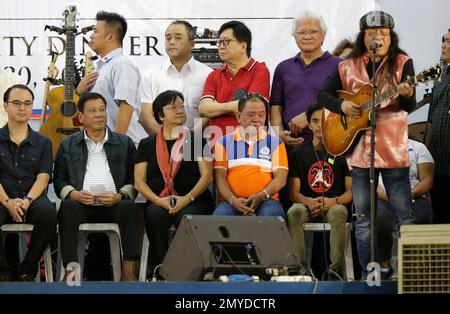
Freddie Aguilar, who passed away on May 27 at age 72 due to multiple organ failure, was one of the Philippines’ most iconic voices. His breakout hit “Anak” touched millions worldwide, telling the story of generational pain, forgiveness, and love. Over the decades, his discography became a soundtrack of national identity, cultural pride, and social struggle. But beyond the fame and acclaim was a quieter narrative—one far less publicized.
While Aguilar captivated concert halls and airwaves, he also traveled off the beaten path: visiting remote barrios, sitting in nipa huts with single mothers, sponsoring the education of out-of-school youth, and helping displaced farmers rebuild their lives. He used his music not only to reflect the struggles of the poor but to relieve them—personally and consistently.
Yet, he never sought credit.
“Freddie didn’t talk about it,” said Maricel Santos, 43, who traveled from Laguna to light a candle at his star. “He paid for my schooling through someone at a foundation. I never even knew it was him until years later.”
For Maricel, and others like her, Wednesday wasn’t just a public tribute. It was personal.
A Crowd Unlike Any Other

As candles flickered in the afternoon breeze, the small crowd grew. An elderly man clutched a tattered photo of Aguilar and wiped tears from his eyes. A tricycle driver stood silently, whispering what seemed like a prayer. A young woman brought a small hand-written note: “You didn’t know me, but you changed my life.”
Many among them had never met each other, but they shared a quiet bond—each a beneficiary of Aguilar’s unseen generosity.
“He helped my brother get treatment when we had no money. No cameras, no media. Just one phone call from someone who said, ‘Ka Freddie wants to help,’” said Ernesto, who declined to give his full name. “That’s why I’m here today.”
Unlike tributes that become spectacles, this one was marked by reverence. Not by fame, but by impact.
The Private Philanthropist

In the days following his passing, more stories like these began to surface. Former scholarship recipients. Medical patients. Small-time vendors and artists. All quietly recalling moments when Aguilar—or someone he quietly instructed—intervened at just the right time.
“He gave without expecting anything,” said his longtime friend and road manager, Leo Javier. “Sometimes even his family didn’t know. He believed real kindness shouldn’t need to be posted.”
Freddie Aguilar wasn’t a billionaire. His wealth came from decades of performing, but he lived modestly compared to others in his league. Much of his earnings, it turns out, went into silent giving—either through anonymous donations or small, personal acts.
“He didn’t want to build empires. He just wanted to build bridges,” Javier added.
A Life Beyond Lyrics
While the nation remembers Freddie as the artist who gave voice to the voiceless, those closest to him now recall a man who lived his lyrics. In “Bayan Ko,” he sang of freedom and dignity. In life, he fought for the dignity of street kids, struggling mothers, displaced workers, and overlooked talents.
His wife Megan and daughter Maegan have since shared that they, too, were stunned by the scale of his generosity, much of which was kept hidden even from them. “I thought I knew my husband well,” Megan told the press. “But the letters and receipts we found after his passing opened a part of his soul he never boasted about.”
Maegan added, “It’s the kind of legacy you don’t see on a playlist.”
A Farewell Full of Heart
The quiet procession at Eastwood may not have made headline news that day, but it reflected something deeper than popularity—it showed purpose.
People came not to see, but to say something. To thank the man who sang for their lives and, more importantly, quietly reached into them.
As dusk fell over Quezon City, candles continued to burn near his star. One child, no more than ten years old, held his mother’s hand as she gently whispered, “That’s the man who helped your kuya go to school.”
The boy looked up, confused. “Did he know us?”
“No,” she said. “But he cared.”
The Legacy Lives On
Plans are underway to establish the Freddie Aguilar Foundation, aimed at continuing his work in education, healthcare, and cultural preservation. Fans, friends, and anonymous donors alike have begun reaching out, offering support.
“This is how we keep his music alive—not just in our ears, but in our actions,” Megan said.
Indeed, Freddie Aguilar’s final song may have already ended—but its echoes are just beginning. In every child who opens a textbook, in every patient who receives care, in every soul he lifted from the shadows—his music lives on.
News
Ellen Adarna and Derek Ramsay Rumored to Have Split—Cristy Fermin Sets the Record Straight
Recently, social media and several online forums have been abuzz with speculation regarding the alleged separation of celebrity couple Ellen…
😱 “Shocking Family FEUD? Ruffa Gutierrez BLASTS Barbie Connection in Explosive Sibling Clash
Ruffa Gutierrez Isiniwalat Naguguluhan Sa Relasyon Nina Richard Gutierrez at Barbie Imperial Biyernes, Hunyo 13, 2025 Agad na naging usap-usapan…
“What Really Happened to Freddie Aguilar’s Inherited Home? Megan’s Quiet Move Sparks Fan Outrage, Hidden Deal Now Exposed!”
MEGAN ADMITS THE TRUTH: “I Was the Reason Freddie Disappeared” — A Nation Demands Answers MANILA, Philippines — In a…
No one saw it coming: Red Sternberg is preparing to step back into the spotlight after years of silence, with a major deal that could completely turn his career around – Michael Flores speaks out for the first time! ‘I’m not coming back to play – I’m coming back to win!’ Red Sternberg declares with confidence.”
Michael Flores reveals Red Sternberg’s plan for showbiz comeback Michael Flores heartbroken over Red Sternberg’s death. Michael Flores (right) on…
Did She Just Meet the In-Laws? Bea Alonzo Spotted Getting Cozy with Vincent Co’s Famil
Bea Alonzo spotted with mom of rumored beau Vincent Co Bea attended an event with Vincent and his family. Ikinatuwa…
My Name Wasn’t in the Will… But What He Left Me Was Priceless” — Maegan Aguilar Uncovers Freddie’s Final Gift 💔✨ “He didn’t leave me money. He left me the truth… and that changed everything.”
“My Name Wasn’t in the Will… But What He Left Me Was Priceless” — Maegan Aguilar Explores Freddie’s Final Gift…
End of content
No more pages to load

